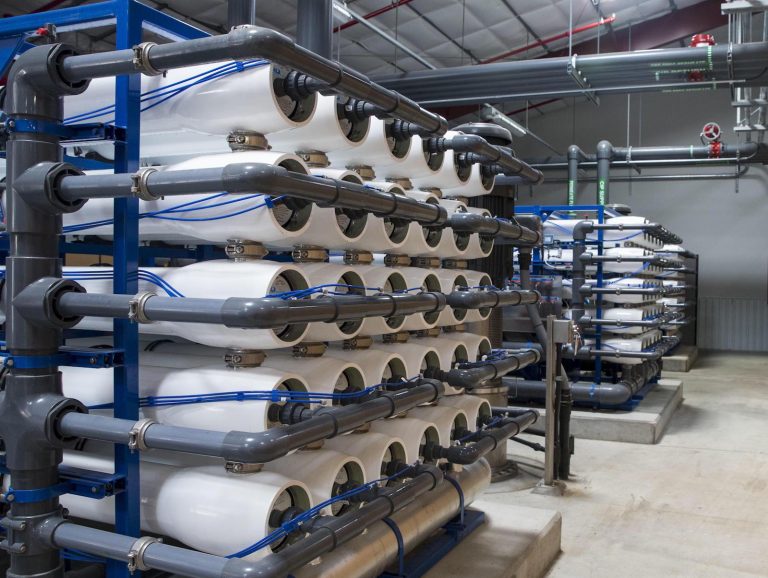4 Benefits of Utilizing Reverse Osmosis Wastewater Treatment For Reuse

When a municipality or business wants to reuse their wastewater, some applications require more treatment than others due to the quality of the wastewater. Many standard wastewater treatment systems consist of pretreatment, primary treatment, and secondary treatment stages. By the end of the secondary stage, a majority of the pollutants, solids, organics, inorganics, and metals have been removed or reduced. This is where reverse osmosis wastewater treatment can be utilized in a third stage process.
“Most” is the operative word here…..
Secondary treatment can offer you an effluent that’s safe to discharge, but it would not meet standards for reuse applications. Such reuse applications may include the following applications below.
Reuse Applications
These reuse applications could be for industrial or municipal wastewater. All of these applications typically require tertiary treatment.
Agricultural irrigation of edible food crops
Irrigation of residential and public landscaping
Structural/nonstructural firefighting
Toilet water
Decorative fountains
Industrial process water that may contact workers
Industrial or commercial cooling or air conditioning
Artificial snowmaking
Cleaning and sanitation
Boiler feedwater
We know there are plenty of places that wastewater or grey water can be reused, and tertiary treatment is needed to ensure that the wastewater is clean enough for those uses, but what specific treatment process is useful at this stage?
The specific tertiary treatment process would be evaluated based on the effluent water quality from a secondary process. Reverse osmosis wastewater treatment is one tertiary treatment process that can be used.
The use of membrane-based technology will ensure that smaller particles that were missed in the previous stages will be taken care of, particularly total dissolved solids (TDS).
However, that’s just one benefit of using reverse osmosis wastewater treatment.
Below, are four more benefits to using reverse osmosis for certain tertiary wastewater treatment applications.
Benefits
Reduces water and sewer discharge costs
Using reverse osmosis for wastewater reuse means you need less raw water from the outset and there is also less water discharged into sewer systems. Industrial facilities can draw large amounts of water for processing from freshwater sources, however, reusing wastewater would reduce that amount. Therefore, the associated costs with procuring raw water would decrease.
In addition, reusing wastewater reduces the volume of untreated wastewater that would be discharged into a local sewer system. Permits for those discharges are partly dependent on the volume that is discharged so reducing that would potentially lower those discharge costs.
Can be integrated with an existing filtration system or other pretreatment technologies to achieve up to 80+% rinse water recycle/reuse
Any amount of wastewater reuse is typically beneficial, but it stands to reason that being able to reuse a higher percentage of this water is more beneficial.
Most wastewater doesn’t yield particularly large percentages of reusable water, but grey water or water used in rinsing processes is usually easier to treat. A secondary stage treatment may yield a fair amount, but the addition of a tertiary treatment can increase that reuse yield. Adding an RO system into that tertiary treatment, can potentially yield over 80% of the wastewater into clean, reusable water.
Modular design for easy installation
Modular is the way to go nowadays. Not all treatment systems can be implemented in modular units, but reverse osmosis wastewater treatment systems can and almost always are available in modular units. These units are compact, so they are easier to move to the desired location and they do not take up a lot of land area. In addition, installation costs are reduced with modular units.
These modular units are simple and easy to install into an integrated treatment system, because they do not have to be built from the ground up within the facility, can merely need to be hooked up in their place in the series. Modular reverse osmosis wastewater units can also be added if the system flow rate is increased, with minimal space footprint.
Utilization of low fouling membrane technology to enable greater water recovery while reducing fouling considerations in wastewater reuse applications.
Using low fouling membrane technology in reverse osmosis wastewater reclamation systems enables lower operational cost. This is due in part as a result of the reduced requirements for membrane cleaning cycles. These particular membrane technologies also enable higher tolerances to fouling contaminants, which extends the life of the membranes as well.
Curious how reverse osmosis can help your industrial business or municipality reuse your wastewater and save money? Contact Genesis Water Technologies, Inc. at 1-877-267-3699 or email us at customersupport@genesiswatertech.com to discuss your wastewater reuse application with one of our water treatment experts.

